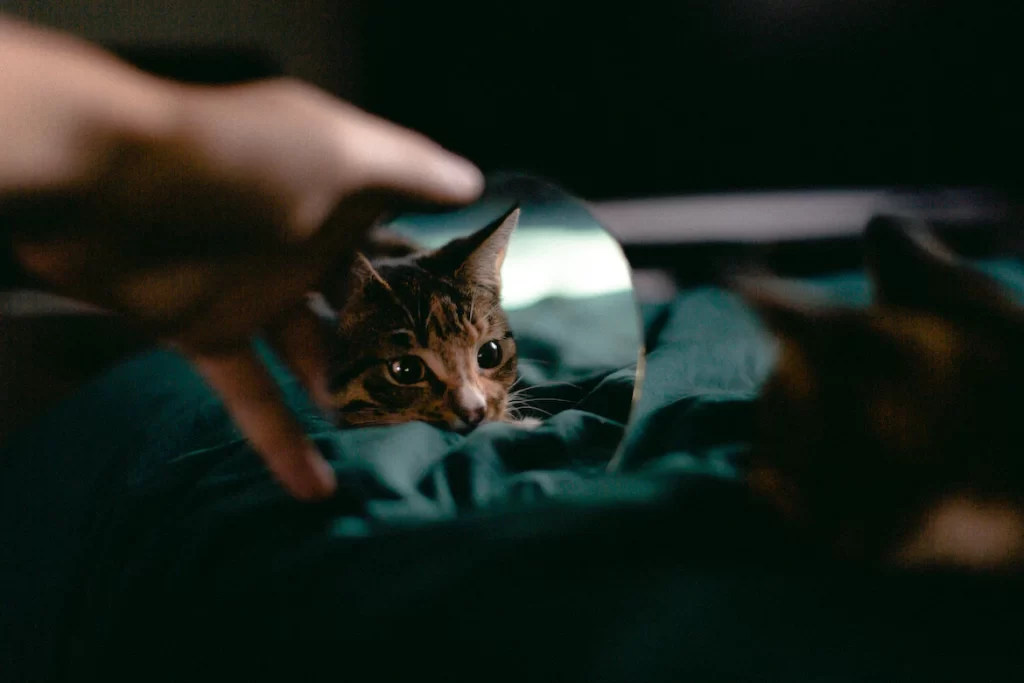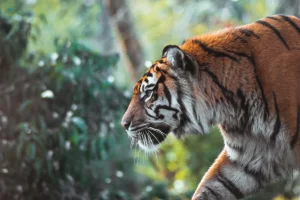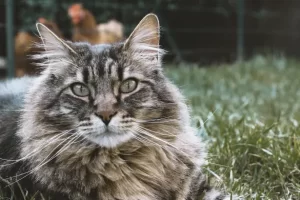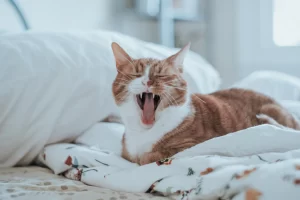Last updated on March 5th, 2023 at 12:14 am

Cats are among the most reared pets by humans because of their friendly nature. They form the primary part of the homestead. Cats are easily maintained because they only need a little attention. Humans discover more about these feline animals daily, bringing them closer to humans. YouTube cat videos go viral, among others, with some of the most viewed cat videos of cats looking in the mirror. Most cats often show a lot of curiosity and interest in looking at their reflection, but the fact is that cats usually do not recognize the reflection in the mirror as their own.
The debate over whether cats recognize themselves in mirrors has been around for many years. Some believe that cats recognize their own reflection and others believe that they do not. While there is no definitive answer as to whether cats recognize themselves in the mirror, there are a few studies that have been done to try and determine the answer.
One study done by researcher Dr. Nicholas Dodman used a mirror to observe cats’ reactions to their own reflection. In this study, Dr. Nicholas Dodman of Tufts University’s Cummings School of Veterinary Medicine used mirrors to observe cats’ reactions to their own reflection. Cats were placed in a room with a mirror and observed for a period of time. The researcher noted whether or not the cats reacted differently when they saw their own reflection. Some cats showed signs of confusion, while others were curious or seemed to be playing with their reflection. The researcher concluded that cats could recognize their own reflection and that they can even become familiar with it over time.
Do Cats Identify Their Reflection In The Mirror?
You may have noticed at some point your kitty glazing in the mirror. Do cats comprehend what mirrors are? Are they aware they are actually looking at a reflection of their own? Scientists have tried to study the aspect of self-awareness in animals for many years; however, the results for various animals have only sometimes been conclusive. Cats’ research has shown that they recognize what mirrors are and the reflections on the mirror according to their reaction.
Dr. Nicholas Dodman, a renowned animal behaviorist, believes that cats are capable of recognizing their reflection in a mirror. According to Dodman, cats usually become fascinated by their own reflection, even if they don’t necessarily recognize themselves. This is because cats are naturally curious and typically enjoy exploring their environment. Dodman believes that cats are able to recognize their reflection, but the extent to which they understand it is unclear. He suggests that cats may be able to recognize their reflection as a version of themselves but may not necessarily be able to differentiate between the reflection and their actual selves. For example, he claims that cats may be surprised if their reflection does something that they themselves don’t do.
Furthermore, Dodman asserts that cats may become aggressive towards their reflection out of fear or frustration. This behavior is due to the fact that cats are territorial and may feel threatened by the presence of a “stranger” that looks like them. Additionally, cats may become frustrated if they cannot interact with their reflection, as they are used to socializing and playing with other cats.
The experiment was conducted over a period of several weeks. The first step of the experiment was to introduce the cats to a mirror without any expectation of them recognizing their own reflection. The cats were allowed to explore the mirror and were observed to see how they reacted. Dodman noted that most cats ignored the mirror, though some showed signs of curiosity. After several weeks, Dodman began to introduce a second stage to the experiment. He placed objects around the mirror that the cats could recognize as belonging to their own reflection. This included toys, food, and other items. The cats were then observed to see if they could recognize their own reflection by interacting with the objects.
The results of the experiment showed that most cats could recognize their own reflection in the mirror. They interacted with the objects around the mirror to confirm their own reflection. Dodman concluded that cats have the ability to recognize their own reflection in a mirror, which makes them unique in the animal kingdom.
How did cats respond to reflections:
- They pawed at the reflection, as if trying to make contact with the reflection.
- They exhibited signs of aggression, such as hissing or growling.
- They seemed to be comforted by the reflection, as if they were in the presence of a familiar companion.
These results suggest that cats may not have the same level of self-awareness as humans. Self-awareness is the ability to recognize oneself in a mirror, and it has been hypothesized to be a key indicator of higher cognition, or intelligence. While the cats in the experiment showed no signs of self-awareness, this does not necessarily mean that cats are not intelligent. They may still possess the ability to recognize themselves, but they may simply require more time and exposure to the mirror in order to do so.
Disapproval Of The Mirror Test
As much as the mirror test is used to measure the cognitive ability of self-awareness in animals, it has faced a lot of criticism. As we mentioned that some researchers believes that cats recognize their own reflection and others believe that they do not. Different researchers have come to point out certain limitations in the procedure. Some scientists say certain physical limitations hinder animals from passing the test. Cats, for example, due to their eyesight limitation, may not be able to see the mark. In addition, other animals may see the mark but may not have the ability to touch it.
To other scientists, the mirror test does not necessarily test self-awareness but is a measure of animals’ curiosity and intelligence. Making it not an effective way to test self-awareness.
These tests do not consider other senses used by animals in processing information. Mirror tests do not test other capabilities of animals to respond to stimuli. The results can therefore be declared biased and not the true reflection of the animals’ self-awareness. Dogs are a good example. They have a perfect sense of smell, but they would still fail the test.
Primates that have very highly evolved brains also fail this test. This is because they show a lack of self-recognition. These animals may recognize their reflections but are less likely to realize it is themselves. This is seen when they respond with hostility to their reflections. It is likely because of the need for more time and space to digest what exactly is required of them. The hostile response is therefore translated into a lack of self-awareness. This may also happen in the case of cats.
Possible Explanation
Cats’ vision is impaired, with an average cat having only a tenth of a clear vision of a human. Cats do not have a wide field of view. They struggle to see objects 20 feet away. They can only visualize a limited range of colors. Cats’ poor vision is another explanation for cats’ difficulty recognizing the red dot on their foreheads during the mirror test.
Cats rely heavily on smell to identify their food, other cats, new surroundings, and hunt. It is also true that cats don’t need to look in the mirror-like humans. They do not pay much attention to themselves to look in the mirror.
When a cat looks at a mirror, what comes into its mind is how to play with the reflection, which to them is another cat on the opposite side; the whole idea, however, takes little time before wearing off.
Many cats and kittens become defensive rather than playful. They notice another animal invading their territory and wish to warn it away. As a result, felines frequently ‘freak out’ and hiss. Their fur may stand on edge sometimes, and they may even growl or spit at the visitor.
Different cats will want to get to the kitty in the mirror. This is common since they don’t recognize themselves, even though they probably know this object is a cat. They see an issue or a companion but not their picture.
Science shows that this happens because of their no specific cat cent between the cat and its reflection in the mirror. Using other senses to decipher what the eyes are saying implies that the kitty in issue has no idea who they’re staring at because their info needs to be more extensive. Just as you could not recognize a photo of yourself under heavy makeup since the look isn’t one with which you are familiar.
Do Cats Respond Harshly To Reflections?
The answer is yes; cats react harshly to their reflections. Cats are territorial animals and are very sensitive to environmental change. If they see a pic of a cat, they may think of it as an intruder and become defensive. The very possessive cat may further respond by hitting the mirror. If the cat has never been exposed to a mirror before, it may feel threatened and agitated.
Related Post: Tips To Help Cats Get Along With Each Others
Friendly cats are generally intrigued by the cats on the mirrors. Such cats respond by cautiously moving toward the mirror, trying to get hold of the reflection, which in their mind is another cat. The cat’s response also depends on how the other cat reacts. If the cat is friendly, the two will play together.
Do Cats Possess Self-Awareness?
You may notice your cat staring at the mirror, does it mean that they recognize their reflection? These are some of the reasons why cats look in the mirror.
- Observing Movement
Seeing other reflections in the mirror may make a cat curious enough to look into the mirror. Cats do not know what they are looking for is practically on their back. They thus look in the mirror to find out what it is and why it’s there.
- Mild desire
Some cats may recognize their reflection in the mirror and may be caught in a moment to check themselves out, but, unlike humans, cats do not look back to reflect on their lives or even emotions.
Why do cats become hostile to the mirror?
When engaging with a mirror, a cat’s natural reaction is to scratch it. It is their nature to respond to anything new to their environment and so the cat scratches the mirror due to the following reasons:
- The cat wants to play with the other cat in the reflection
- The cat is curious about the reflection
- Cats think it’s a way of drawing attention to them
Cats respond differently to their reflections. They use their eyes, tails, and paws to relay their feelings and reactions. Some cats may hiss, meow, or scratch their fellow cats to communicate. They may also share using different body language like showing their teeth. The curiosity of a cat does not depend on age. Even young cats want to discover what the reflection is. Cats connect with humans when they meow.
Conclusion
Based on Dr. Nicholas Dodman’s experiment, cats do recognize themselves in the mirror and can use the reflection to orient themselves. The study shows that cats do indeed possess self-awareness and can recognize their own reflection, suggesting that cats have a sense of identity. This conclusion is supported by the fact that cats in the experiment showed increased facial and body movements, prolonged gazes, and other behaviors that indicate recognition of the reflection in the mirror. This experiment provides insight into the cognitive abilities of cats, further illustrating their intelligence and self-awareness. It is likely that cats possess a basic level of self-awareness and are able to recognize their own reflection in the mirror.


